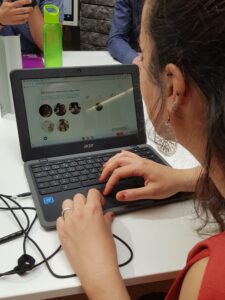The Agentschappen Integratie & Inburgering (Agencies of Integration) want to help newcomers find their place in the Belgian community. With that in mind, the project ‘Online Leren in MO’ was created in 2021 as part of the social orientation course. The goal of that project was to offer teachers and members of the course an online platform with varied course material in no less than 25 languages. The course material prepares the newcomers to take an integration test, in their own language or a language they speak well enough. That takes a lot of translating – and that happens to be the strong suit of Untranslate.
In the social orientation course, newcomers learn about life in Belgium: How do I find a job? Where do I go for medical help? And how does public transport work?
To answer these questions in an interactive way and actively involve the students in the course, the Agentschappen use blended learning. This teaching method combines online and traditional learning in an intuitive e-learning platform. That way the course members don’t have to use pen and paper or go to class every day, but they can go through the online modules at their own pace. Besides the course modules, the platform also offers informative knowledge clips, animated videos and infographics to visually develop essential (digital) competencies.

As project promoter, the Flemish Agency of Integration, found in Untranslate a partner that could translate the Dutch pilot version of the project ‘Online Leren in MO’ to Arabic, English and French. On top of that, the integration test had to be translated from English to Hindi, Kurdish, Pashto, Somali, Thai, Tigrinya and Urdu. Because of the recent stream of refugees from Ukraine, Ukrainian was also added to that list. Untranslate gathered specialised linguists to translate and revise in their mother tongue, ensuring a qualitative and efficient transfer of the content and the context from one language to another.
Translating bidirectional languages
Languages like Arabic, Urdu and Pashto are bidirectional languages or BiDi languages. BiDi languages are languages that are written from right to left, but in which some characters, such as numbers and punctuation, can also be written from left to right. The layout of the translations of the online course and test material also required a context-sensitive approach. In Arabic, for instance, block letters are not used to emphasise words. Untranslate consulted native speakers for a suitable solution: putting words in bold resulted to be the best approach. In Pashto, the same problem occurred, but the same approach could not be applied. Once again native speakers were consulted, and they concluded that underlining words was the preferable option.
Translating in different tools.
In the pilot project, the Agentschap used different channels and tools. The modules were developed in the e-learning system Articulate Storyline, the videos were made using the animation software PowToon and the infographics were designed in the online design platform Canva. The material was often available in visual as well as audio format, resulting in different file formats that each required a specific approach.

Specific terms and sensitive information
Because of the Agentschap’s unique approach, the translators and revisers were extensively briefed for the execution of both projects. They had to adhere to a detailed style guide and terminology list. Terms like ‘OCMW’ or ‘De Lijn’ remained untranslated, while a term like ‘remgeld’ (co-payment) was followed by a description or a translation between brackets. The translators and revisers also signed a non-disclosure agreement to show their devotion to the project and to ensure that no information was leaked.
Quality control and proactive communication
Before the start of the project, the project managers at Untranslate checked the source files for content-related issues to ensure qualitative translations. They updated the Agentschap about possible ambiguities or vagueness in the source file to avoid that a confusing passage still needed clarification in the production phase. Moreover, the project managers at the Agentschap had access to the working versions of the modules, so they could follow the translation process actively and in real-time.

Thanks to a fine piece of project management, both translation projects were successfully executed with special attention to the differences between the source and target languages. By taking into account the Agentschap’s translation needs as well as the end users’ learning needs, Untranslate acted as a bridge builder to facilitate the road to integration. And even the project managers, translators and revisers at Untranslate learnt something about the history of the Belgian social security system, the advantages and disadvantages of renting versus buying or about the waste sorting rules.
Are you looking for a specialised translation agency that pulls out all the stops to take your digital project to the next level? Be it an e-learning platform or another multilingual project: our language experts help you from start to finish. Contact us for advice tailored to your needs without any strings attached.

